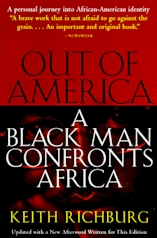

|
|||||
|
|
As always the article is available for download as a Word-document on the final page (p. 11)
FOURTH QUARTER 2003: |
||||
|
1:11 by Henrik Østergaard Breitenbauch, co-editor of RÆSON magazine |
|||||
|
|
|||||||||
|
Based on his experiences there, he published in 1997 a very well-written, honest and provocative book about his experiences in Africa as a black western reporter. The Wall Street Journal wrote about Out of America: A Black Man Confronts Africa: ”Striking in both its honesty and horror… A gripping memoir, a passionate reminder to a multiethnic democracy that human dignity … is the source of enduring civic and personal esteem”. |
 |
||||||||
| After leaving Africa, Richburg has been stationed in Hong-Kong, Bangkok, and Paris, and has reported from the East Timor secession as well as the wars in Afghanistan and Iraq. | |||||||||
1. What the Young
Europeans Forget
2. What Europe Turns its Back On
3. What the USA Turns its Back
On
4. Berlusconi: The People’s Will
5. Ignored by Democrats and Republicans
both
6. Africa’s Still Sliding Backwards
7. Brought to Light by 9/11
8. The Easy
Guerilla Victory
9. Coming Good, Leaving Better
10. Tell Me What You See11. From
Detroit to Hindu Kush
What the Young Europeans Forget
When we look at the transatlantic relationship, there seems to be some differences which are deeper than merely policy positions (as Robert Kagan pointed out in his Of Paradise and Power). Or at least there is a conception of such differences, which, in turn, is part of a domestic political game on both sides of the Atlantic?
KR: I have been traveling over much of Europe and I do agree just like the book says: Americans are from Mars and Europeans are from Venus. But what I find disappointing about the whole debate is that the two sides do not acknowledge that each other have some serious points. The Europeans think the Americans are crazy, that they’re gun happy warmongers, etc. The Americans think the Europeans are soft, that all they’re interested in are their welfare state; that they don’t want to work etc, etc. There is no real dialogue to try to understand the basis of the differences, which are actually rooted in history. So here in Europe - even if I do not consider myself very pro-American – I have to explain to people that there are reasons why America does things.
Take the period before the war in Iraq: everybody was blaming the US for the sanctions policy that was “killing Iraqi babies”, and I had to say: “wait a minute, this didn’t just come in to being when America decided one day to put sanctions on Iraq”. You have to go back to when Iraq invaded Kuwait. There was not even an end of the war: there was a ceasefire-agreement, under which Iraq agree to disarm, and sanctions where imposed until [Saddam Hussein] disarmed. I talked to a lot of young Europeans and you couldn’t explain this to them: that the sanctions didn’t just come up because America and Britain hate Arab people, and wanted to put sanctions on Iraq.
There may also be, in Europe, a lack of comprehension as to how the American political system works?
KR: Exactly. That leads to simplifications of the issues. I generally agree with the Europeans, but the problem is when they look for solutions in a way they would have been made in their own countries. Take France, which is a very centralized country: if there’s a problem, you pass a law and try to get rid of it. For example, people say: “the death penalty is bad” and I happen to agree with that. Then they’ll say: “how come the president of the United States doesn’t just abolish the death penalty?” But it doesn’t work that way: each state sets its own laws, and if that state has a death penalty, there’s nothing the President can to change that.
Many Europeans do not quite seem to understand that about the US. In America, guns are a problem, and everybody acknowledges that, but it is a state by state issue. States like New York or California have very strict gun control laws, whereas other states don’t. There’s no national law where the president can just wave a magic wand and all of a sudden all the guns disappear – it doesn’t work that way.
That is another difference: the political role of the judiciary in the States, where in Europe, often, most of the power is with the executive.
KR: Yes, we have a constitution that matters, whereas a lot of countries like France have gone through quite a few constitutions in their history, and Britain doesn’t even have one. So to a lot of the European people a constitution doesn’t mean anything, or you can just change it with a law. The idea that you have a right to bear arms – however you want to interpret that – the fact is that it’s in the Constitution. It’s hard just to pass a law to change something in a constitution that is considered sacred.
So the concept of the “rule of law” has another kind of significance in the Anglo-Saxon common law countries?
KR: That’s right. In the States, the laws made by Congress must comply with the constitution, whereas in Europe Parliament makes the law. Another thing is, a lot of Europeans I talk to in their 20s or early 30s, when they criticize the US they seemingly do it from a point of ignorance about their own history. They seem to think that because they in the last 20 years have built up very egalitarian social societies … they seem to forget that it took them a very long time to get there. When I have friends criticizing the death penalty in the States, I have to say: “wait a minute, it was Mitterand who abolished the death penalty in France, it’s not like you guys didn’t have a death penalty for a 100 years. And after the liberation in France you were hanging people in the streets…” [laughs]. So you’re criticizing us for having a death penalty and you’ve only been without one in 20 years.
Concerning the attempt in Europe to overdo the differences between the States and Europe, people tend to forget that countries like Spain and Portugal recently came out from dictatorships, and France basically, this time around, wasn’t an operative democracy until the first change of power with Mitterand?
KR: That’s my point exactly. I mean: you just have to remind Europeans that before you get on your high horses and start criticizing how bad America is you have to look back 20 years. But it’s hard to say that to somebody who’s 25 years old because they don’t remember it any other way. An Italian friend was constantly criticizing what the US does, but for a long time Italy wasn’t even a real country: look at the Mussolini years, the influence of the Mafia, the Red Brigades were killing people, and now you have a guy elected who has very questionable connections. In Greece you had the November 17 movement: so Europe was a fairly chaotic place as late as the 60s and 70s.